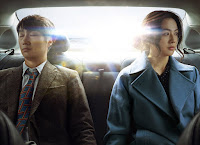Hae-joon is the kind of relentlessly diligent detective, who might be a little too professional for his fellow cops—the kind that prefer to wrap cases up quickly. Seo-rae is such a composed widow, Hae-joon’s colleagues automatically suspect the worst of her, even though there is no direct evidence implicating her. The prospect of Hae-joon investigating Seo-rae is a potentially perfect storm of frustration for the Busan police, especially as the cop and suspect start to recognize their mutual attraction in Park Chan-wook’s Decision to Leave, which opens today in New York.
Seo-rae’s husband was an experienced climber, but apparently, he took a wrong step after summitting his favorite nearby mountain. He met Seo-rae through his work with the Korean immigration service, where he was known for his greasy palm, but Seo-rae already had an advantage over other asylum-seekers. Her Manchurian grandfather had served in the Korean resistance army, battling the Japanese occupation. That is one of the reasons Hae-joon feels sympathy for her, besides her striking looks and dignified reserve. He even orders an expensive (and somewhat romantic) sushi meal for two, during their initial interview.
Even though Hae-joon already has an extractive wife at home, he often volunteers for stakeouts, because of his persistent insomnia. As a result, he finds himself watching Seo-rae late at night, which leads to a weird voyeuristic intimacy between them, since she also knows he’s there. Soon, they just so happen to meet and share real meals together. Consciously or unconsciously, Hae-joon leads the investigation away from her. Frankly, his other murder case has a much higher priority, but it will reflect ironic insights on the death of Seo-rae’s husband. Then, rather masterfully, Park orchestrates another meeting between Hae-joon and Seo-rae, several years later and under weirdly familiar circumstances.
Decision to Leave is an extraordinarily subtle and self-disciplined thriller, but it is absolutely enthralling. You can make it superficially sound like a murder-mystery with “black widow” thriller potential, but it runs much deeper than that. It is about inconveniently coming to terms with love and the things it makes people do.
Tang Wei should really think about re-locating to Korea, because playing a Chinese immigrant who voluntarily and enthusiastically opts for a new life in the ROK is not likely to endear her to Xi’s super-trolls (the same breed who attacked her after the release of Ang Lee’s Lust, Caution). Without question, it is her best role since Ann Hui’s The Golden Era. Given her previous Korean film, Kim Tae-yong’s Late Autumn, Tang clearly gets better parts from Korean filmmakers. In the case of Decision, she simply amazing as Seo-rae. She is one of the most seductive femme fatales maybe ever, yet she is also arrestingly tragic and altogether haunting as Seo-reo.
Park Hae-il is also the perfect Hitchcockian everyman as Hae-joon and his on-screen chemistry with Tang is absolutely electric. He really is the kind of cop who is just too darned decent and conscientious for his own good. Both Parks vividly establish his tragic Achilles heel almost immediately, which sets up so many of the subsequent conflicts.
Decision to Leave is a great film—and in its own unique way, a terrific thriller. It is the sort of film in which every scene has great meaning, which often only become clear after subsequent revelations. You have to pay attention, but it is impossible to look away. Very highly recommended. Decision to Leave opens today (10/14) in New York, at the Angelika Film Center.

